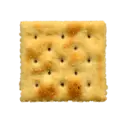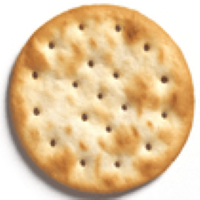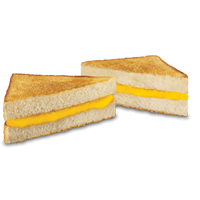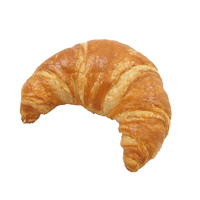Saltine cracker (includes oyster, soda, soup) nutrition: calories, carbs, GI, protein, fiber, fats
Crackers, saltines (includes oyster, soda, soup)
*all the values are displayed for the amount of 100 grams
Top nutrition facts for Saltine cracker (includes oyster, soda, soup)

| Calories ⓘ Calories for selected serving | 418 kcal |
|
Glycemic index ⓘ
Source:
The GI for Coleus tuberosus crackers is 41 http://www.ifrj.upm.edu.my/25%20(01)%202018/(42).pdf
Check out our Glycemic index chart page for the full list.
|
74 (high) |
| Glycemic load | 8 (low) |
| Insulin index ⓘ II for water crackers https://academic.oup.com/ajcn/article/66/5/1264/4655967 | 87 |
| Net Carbs ⓘ Net Carbs = Total Carbohydrates – Fiber – Sugar Alcohols | 71 grams |
| Default serving size ⓘ Serving sizes are mostly taken from FDA's Reference Amounts Customarily Consumed (RACCs) | 5 crackers (14.9 grams) |
| Acidity (Based on PRAL) ⓘ PRAL (Potential renal acid load) is calculated using a formula. On the PRAL scale the higher the positive value, the more is the acidifying effect on the body. The lower the negative value, the higher the alkalinity of the food. 0 is neutral. | 4.4 (acidic) |
Net carbs ⓘHigher in Net carbs content than 94% of foods
Sodium ⓘHigher in Sodium content than 94% of foods
Carbs ⓘHigher in Carbs content than 92% of foods
Iron ⓘHigher in Iron content than 90% of foods
Vitamin B1 ⓘHigher in Vitamin B1 content than 87% of foods
Saltine cracker (includes oyster, soda, soup) calories (kcal)
| Calories for different serving sizes of saltine cracker (includes oyster, soda, soup) | Calories | Weight |
|---|---|---|
| Calories in 100 grams | 418 | |
| Calories in 1 cracker, oyster | 4 | 1 g |
| Calories in 1 cracker square | 13 | 3 g |
| Calories in 1 cracker, rectangle | 25 | 6 g |
| Calories in 1 cracker, round large | 42 | 10 g |
| Calories in 0.5 oz | 59 | 14.2 g |
| Calories in 5 crackers | 62 | 14.9 g |
| Calories in 1 cup oyster crackers | 188 | 45 g |
| Calories in 1 cup, crushed | 293 | 70 g |
Extra Nutrition facts for Saltine cracker (includes oyster, soda, soup)
| Protein per 100 calories ⓘ Shows how many grams of protein you get from 100 calories of this food, calculated as (protein in g ÷ calories) × 100. | 2.3 g |
| Calories per 10 g protein ⓘ Shows how many calories you need to eat from this food to get 10 g of protein, calculated as (calories ÷ protein in g) × 10. | 442 kcal |
Saltine cracker (includes oyster, soda, soup) Glycemic index (GI)
Source:
The GI for Coleus tuberosus crackers is 41 http://www.ifrj.upm.edu.my/25%20(01)%202018/(42).pdf
Check out our Glycemic index chart page for the full list.
Saltine cracker (includes oyster, soda, soup) Glycemic load (GL)
Mineral coverage chart
Mineral chart - relative view
Vitamin coverage chart
Vitamin A:
3µg of 900µg
0.33%
Vitamin E:
3.5mg of 15mg
23%
Vitamin D:
0µg of 20µg
0%
Vitamin C:
0mg of 90mg
0%
Vitamin B1:
2.1mg of 1mg
176%
Vitamin B2:
1.5mg of 1mg
112%
Vitamin B3:
19mg of 16mg
121%
Vitamin B5:
1.6mg of 5mg
32%
Vitamin B6:
0.26mg of 1mg
20%
Folate:
402µg of 400µg
101%
Vitamin B12:
0.27µg of 2µg
11%
Vitamin K:
76µg of 120µg
64%
Vitamin chart - relative view
Macronutrients chart
Protein:
Daily Value: 19%
9.5 g of 50 g
9.5 g (19% of DV )
Fats:
Daily Value: 13%
8.6 g of 65 g
8.6 g (13% of DV )
Carbs:
Daily Value: 25%
74.1 g of 300 g
74.1 g (25% of DV )
Water:
Daily Value: 0%
5.1 g of 2,000 g
5.1 g (0% of DV )
Other:
2.8 g
2.8 g
Protein quality breakdown
Tryptophan:
348mg of 280mg
124%
Threonine:
804mg of 1,050mg
77%
Isoleucine:
999mg of 1,400mg
71%
Leucine:
1956mg of 2,730mg
72%
Lysine:
516mg of 2,100mg
25%
Methionine:
441mg of 1,050mg
42%
Phenylalanine:
1350mg of 1,750mg
77%
Valine:
1197mg of 1,820mg
66%
Histidine:
591mg of 700mg
84%
Fat type information
Saturated fat:
1.7 g
Monounsaturated fat:
2 g
Polyunsaturated fat:
4.8 g
Carbohydrate type breakdown
Starch:
68 g
Sucrose:
0 g
Glucose:
0.12 g
Fructose:
0.19 g
Lactose:
0 g
Maltose:
0.98 g
Galactose:
0 g
Fiber content ratio for Saltine cracker (includes oyster, soda, soup)
Sugar:
1.3 g
Fiber:
2.8 g
Other:
70 g
All nutrients for Saltine cracker (includes oyster, soda, soup) per 100g
| Nutrient | Value | DV% | In TOP % of foods | Comparison |
| Vitamin A | 1µg | 0% | 72% | |
| Calories | 418kcal | 21% | 13% |
8.9 times more than Orange
|
| Calories per 10 g protein | 442kcal | N/A | 72% | |
| Protein | 9.5g | 23% | 45% |
3.4 times more than Broccoli
|
| Protein per 100 calories | 2.3g | N/A | 68% | |
| Fats | 8.6g | 13% | 38% |
3.9 times less than Cheese
|
| Vitamin C | 0mg | 0% | 100% |
N/A
|
| Net carbs | 71g | N/A | 6% |
1.3 times more than Chocolate
|
| Carbs | 74g | 25% | 8% |
2.6 times more than Rice
|
| Cholesterol | 0mg | 0% | 100% |
N/A
|
| Vitamin D | 0µg | 0% | 100% |
N/A
|
| Magnesium | 23mg | 5% | 50% |
6.1 times less than Almonds
|
| Calcium | 19mg | 2% | 55% |
6.6 times less than Milk
|
| Potassium | 152mg | 4% | 70% |
Equal to Cucumber
|
| Iron | 5.6mg | 70% | 10% |
2.1 times more than Beef broiled
|
| Sugar | 1.3g | N/A | 64% |
7 times less than Coca-Cola
|
| Fiber | 2.8g | 11% | 28% |
1.2 times more than Orange
|
| Copper | 0.14mg | 15% | 40% |
Equal to Shiitake
|
| Zinc | 0.69mg | 6% | 62% |
9.1 times less than Beef broiled
|
| Starch | 68g | 28% | 87% |
4.4 times more than Potato
|
| Phosphorus | 102mg | 15% | 63% |
1.8 times less than Chicken meat
|
| Sodium | 941mg | 41% | 6% |
1.9 times more than White bread
|
| Vitamin E | 1.2mg | 8% | 45% |
1.3 times less than Kiwi
|
| Manganese | 0.69mg | 30% | 35% | |
| Selenium | 10µg | 19% | 59% | |
| Vitamin B1 | 0.7mg | 59% | 13% |
2.6 times more than Pea raw
|
| Vitamin B2 | 0.49mg | 37% | 15% |
3.7 times more than Avocado
|
| Vitamin B3 | 6.4mg | 40% | 22% |
1.5 times less than Turkey meat
|
| Vitamin B5 | 0.54mg | 11% | 56% |
2.1 times less than Sunflower seeds
|
| Vitamin B6 | 0.09mg | 7% | 68% |
1.4 times less than Oats
|
| Vitamin B12 | 0.09µg | 4% | 63% |
7.8 times less than Pork
|
| Vitamin K | 25µg | 21% | 46% |
4 times less than Broccoli
|
| Folate | 134µg | 34% | 21% |
2.2 times more than Brussels sprouts
|
| Trans fat | 0.17g | N/A | 58% |
89.2 times less than Margarine
|
| Saturated fat | 1.7g | 8% | 51% |
3.6 times less than Beef broiled
|
| Choline | 17mg | 3% | 78% | |
| Monounsaturated fat | 2g | N/A | 53% |
4.9 times less than Avocado
|
| Polyunsaturated fat | 4.8g | N/A | 18% |
9.8 times less than Walnut
|
| Tryptophan | 0.12mg | 0% | 76% |
2.6 times less than Chicken meat
|
| Threonine | 0.27mg | 0% | 80% |
2.7 times less than Beef broiled
|
| Isoleucine | 0.33mg | 0% | 79% |
2.7 times less than Salmon raw
|
| Leucine | 0.65mg | 0% | 79% |
3.7 times less than Tuna Bluefin
|
| Lysine | 0.17mg | 0% | 87% |
2.6 times less than Tofu
|
| Methionine | 0.15mg | 0% | 79% |
1.5 times more than Quinoa
|
| Phenylalanine | 0.45mg | 0% | 77% |
1.5 times less than Egg
|
| Valine | 0.4mg | 0% | 79% |
5.1 times less than Soybean raw
|
| Histidine | 0.2mg | 0% | 80% |
3.8 times less than Turkey meat
|
| Fructose | 0.19g | 0% | 91% |
31.1 times less than Apple
|
| Caffeine | 0mg | 0% | 100% | |
| Omega-3 - EPA | 0g | N/A | 100% |
N/A
|
| Omega-3 - DHA | 0g | N/A | 100% |
N/A
|
| Omega-3 - ALA | 0.54g | N/A | 80% |
17.1 times less than Canola oil
|
| Omega-3 - DPA | 0g | N/A | 100% |
N/A
|
| Omega-3 - Eicosatrienoic acid | 0g | N/A | 93% | |
| Omega-6 - Gamma-linoleic acid | 0.02g | N/A | 83% | |
| Omega-6 - Dihomo-gamma-linoleic acid | 0g | N/A | 100% | |
| Omega-6 - Eicosadienoic acid | 0g | N/A | 85% | |
| Omega-6 - Linoleic acid | 4.3g | N/A | 82% |
2.9 times less than Almonds
|
Check out similar food or compare with current
NUTRITION FACTS LABEL
Nutrition Facts
___servings per container
Serving Size ______________
Serving Size ______________
Amount Per 100g
Calories 418
% Daily Value*
13%
Total Fat
8.6g
7.5%
Saturated Fat 1.7g
0
Trans Fat
0g
0
Cholesterol 0mg
41%
Sodium 941mg
25%
Total Carbohydrate
74g
11%
Dietary Fiber
2.8g
Total Sugars 0g
Includes ? g Added Sugars
Protein
9.5g
Vitamin D
0mcg
0
Calcium
19mg
1.9%
Iron
5.6mg
70%
Potassium
152mg
4.5%
*
The % Daily Value (DV) tells you how much a nutrient in a serving of food contributes to a daily diet. 2,000 calories a day is used for general nutrition advice.
Health checks
ⓘ
Dietary cholesterol is not associated with an increased risk of coronary heart disease in healthy individuals. However, dietary cholesterol is common in foods that are high in harmful saturated fats.
Source
Low in Cholesterol
ⓘ
Trans fat consumption increases the risk of cardiovascular disease and mortality by negatively affecting blood lipid levels.
Source
No Trans Fats
ⓘ
Saturated fat intake can raise total cholesterol and LDL (low-density lipoprotein) levels, leading to an increased risk of atherosclerosis. Dietary guidelines recommend limiting saturated fats to under 10% of calories a day.
Source
Low in Saturated Fats
ⓘ
While the consumption of moderate amounts of added sugars is not detrimental to health, an excessive intake can increase the risk of obesity, and therefore, diabetes.
Source
Low in Sugars
References
All the values for which the sources are not specified explicitly are taken from FDA’s Food Central. The exact link to the food presented on this page can be found below.


